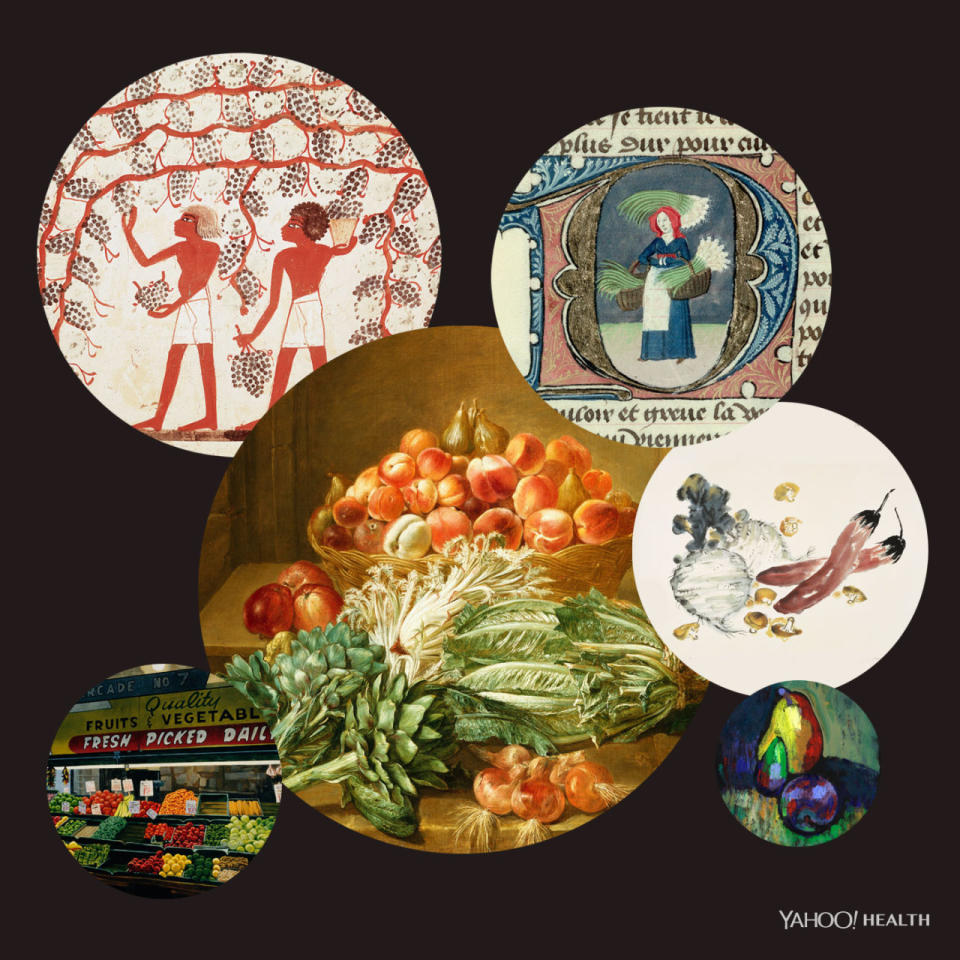From Rocket to Nut Roasts to Brussels Sprouts: A Look at Vegetarianism Throughout Time
Twenty-six years ago, when registered dietitian Jill Nussinow began teaching vegetarian cooking at Santa Rosa Junior College in California, her classes were so packed that many people couldn’t even get in.
Things are a little less crazy these days, but that’s not necessarily a bad thing — consider it a testament to how much more mainstream vegetarianism has become.
“If you look back even 10 years ago, we were in a different place,” Nussinow tells Yahoo Health. “Today, so many more people are teaching vegetarian and plant-based cooking. There’s a ton of information out there, many vegetarian and vegan blogs, and it’s so much easier to be a vegetarian than it was.”

People have been vegetarians for thousands of years — but the reasons for going plant-based haven’t always been the same. (Photo Illustration: Corbis/Yahoo Health)
There’s no doubt about it: The number of vegetarians (those who do not consume meat or fish, and sometimes not even eggs) and vegans (those who do not consume any animal products) in the U.S. has increased over the past 30 years. “Recent polls put the number at around 8 percent in the U.S.,” says Nick Cooney, director of education at the non-profit animal advocacy organization Mercy for Animals, which promotes vegan and vegetarian eating while exposing cruelty to farm animals.
Eight percent isn’t the majority, of course, but it is still significant. And importantly, “there’s also been a real increase in the number of people who are cutting back on meat,” says Cooney who also wrote Veganomics: The Surprising Science of Vegetarians, from the Breakfast Table to the Bedroom and founded the The Humane League, which develops online and community-based vegetarian eating programs. “In the past decade, per capita meat consumption in the U.S. has dropped by 10 percent, so the average American is eating less meat than in 2005 and 2006,” Cooney adds. “This is the first marked decrease in meat consumption in this country since the Great Depression.”
Vegetarianism, though, is not a new concept. Since the beginning of time, people have abstained from eating meat for a number of reasons, sometimes drawing both ire and condemnation. Society’s attitudes toward vegetarianism have also changed through the ages.
Vegetarianism Throughout History
While many of today’s vegetarians abide by the eating style for health reasons, respect for animals has always been at the core. (In fact, Cooney, believes the main catalyst for the modern day interest in vegetarianism and veganism is the increase in public awareness over the treatment of farm animals: “Twenty years ago, the average American wouldn’t have seen photos or videos from inside factory farms,” he says.)
While respect for animals has always been at the core of vegetarianism, in ancient times the impetus had more to do with the animal’s spirit being reincarnated, says Colin Spencer, former food columnist for The Guardian and author of Vegetarianism: A History. “The idea was that a spirit is reborn and travels from one animal to another, but could also be reborn in any person, so you didn’t know who you were eating,” he tells Yahoo Health.
That idea guided Greek mathematician Pythagoras, one of the earliest vegetarians on record, but was already important in Ancient Egypt, where as far back as 3000 BC, certain priests and sects abstained from eating meat and wore papyrus sandals instead of leather out of respect for the spirit of an animal and the idea of its rebirth.
Vegetarianism “would have traveled along the Old Silk Route and found reception in India,” Spencer says, where non-violence toward animals became a core tenet of a number of religions, including Hinduism, Buddhism, and Jainism. Certain Christian sects like the Seventh Day Adventists also practice vegetarianism. But by and large, vegetarianism as a stated practice virtually disappeared in Europe until the 19th century. In fact, in the Middle Ages, those who proclaimed themselves vegetarian were persecuted as heretics, Spencer says, even though meat was, ironically, difficult to obtain at the time and only very affluent people had access to it on a regular basis. Then, as colonialism flourished and the European middle class became more affluent, meat became more accessible and its consumption increased — in tandem with a renewed interest in vegetarianism from different quarters, including Christian groups and intellectuals across Europe interested in health and well-being, self improvement, and animal welfare.

The link between vegetarianism and health drew people like Ambrosius Hiltl, a German tailor who emigrated to Switzerland in the latter part of the 19th century. Hiltl, who suffered from advanced rheumatoid arthritis, was told that a strict vegetarian diet was the only thing that could cure him, and he decided to try it out for three months. The diet seemed to do wonders for his condition, his great-grandson Rolf Hiltl tells Yahoo Health, and Ambrosius became a vegetarian. In 1898, he founded Haus Hiltl, which is the Guinness World record-holder for oldest vegetarian restaurant. Today, it is still a hugely popular establishment in Zurich.

Haus Hiltl is the first vegetarian restaurant in the world. (Photo: Photo: Moosewood Restaurant/Facebook)
What Historical Vegetarians Ate
Vegetarians in ancient Egypt and Greece ate tabbouleh and bulgur wheat, which they made into many different kinds of breads, Spencer says. They also consumed different kinds of wild herbs, grasses, and leaves: “Rocket [a type of salad popular in England since the Elizabethan Era] was first discovered as a weed in corn fields in the Middle East,” he says. Edible roots and tubers were boiled and roasted, and eggs, nuts, seaweed, fruits, and olives were all fundamental elements of their diet.
In 19th century Europe, though, the vegetarian diet was “rather stodgy and tasteless,” Spencer says, with many foods fashioned to taste like meat, such as nut cutlets and nut roasts. “There are plenty of early vegetarian cookery books, all thoroughly in our eyes uninspired, but dullness had then a religious aspect: It meant modesty, knowing one’s place, not drawing attention to oneself.”
Related: Why Some Vegetarians Start Craving Meat
That’s why Zurich’s Haus Hiltl managed to distinguish itself and gain popularity. Although early dishes were more “Germanic” in nature (think cauliflower, cabbage, and potato bakes), the Hiltl family has always focused on finding the best vegetarian dishes around the globe and bringing these back to Zurich, Rolf says. Since the 1950s, the restaurant — like Ithaca, New York’s famed Moosewood restaurant — has offered a wide and varied array of vegetarian and vegan food inspired by global flavors, and it prepares vegetarian meals for Swiss International Airlines’ European flights.

Moosewood Restaurant in Ithaca, New York. (Photo: Moosewood Restaurant/Facebook)
Vegetarianism and Health
Cooney attributes the rise in vegetarianism over the past couple of decades to research showing the health benefits of a plant-based diet. In the 1990s, doctors like John McDougall and Dean Ornish advocated low-fat and/or mostly vegan diets for health. And the U.S. government’s longstanding meat- and dairy-based “Basic Four” food groups was replaced with the Food Pyramid, which prioritized grains, vegetables, beans, and fruits. In 2003, the “Meatless Monday” campaign gained firepower.
Today, surveys show that health is a key motivator of vegetarianism, says Sharon Palmer, RDN, author of The Plant-Powered Diet and Plant-Powered for Life and a nutritionist who advocates eating a plant-based, vegetarian diet.
“In the 1960s, vegetarian diets were considered risky and our knowledge of nutrition at this time focused on nutrition deficiencies, so a vegetarian diet was considered deficient by many people in mainstream health,” she says. “Today, thanks to a body of research, we know that vegetarian diets can meet your nutritional needs and provide health benefits, including lower risk of heart disease, Type 2 diabetes, hypertension, obesity, and certain cancers. A healthful vegetarian diet is high in fiber, which promotes satiety and weight loss.”
Related: The Digestive Perks Of Being A Vegetarian
Because a healthy vegetarian diet is naturally low in saturated fat and high in fiber and phytochemicals that can help guard against different sorts of cancers, research in this area is growing. According to a recent study published in JAMA Internal Medicine, vegetarians were 22 percent less likely to develop colorectal cancer than non-vegetarians.
Research has also shown a link between vegetarianism and longevity: According to a 2013 study, vegetarians had a lower death rate due to heart disease, diabetes, and renal disorders compared with non-vegetarians.
Vegetarianism Today: More Flexible?
The body of research supporting the many benefits of a vegetarian diet is extensive. Today, celebrities ranging from Ellen DeGeneres to Beyonce Knowles and Bill Clinton are either vegetarian or vegan. Nevertheless, 84 percent of Americans who have tried being vegetarian or vegan go back to eating meat, according to a 2014 study by Faunalytics (formerly the Humane Research Council), a nonprofit organization that provides animal advocates with access to the research on issues including factory farming and veganism.
At the same time, though, Americans are eating less meat and many more are attuned to the values of eating mostly plants, an eating style supported by people like former New York Times food columnist Mark Bittman, registered dietitian and The Flexitarian Diet author Dawn Jackson Blatner, and Dr. Michael Roizen, chief wellness officer of The Cleveland Clinic.
“More and more people are interested in flexitarianism today,” Palmer says. “The definition, according to the Academy of Nutrition and Dietetics, of a plant-based diet is one that ‘focuses on plant foods.’ That gives room for a spectrum of diets, with vegan being the most strict, and semi-vegetarian or flexitarian being the least strict.”
Overall, more Americans are understanding that a healthy diet is one that is heavily centered around minimally processed, nutrient-dense vegetables, fruits, and grains. The greater availability of tasty vegetarian and vegan foods in supermarkets and restaurants, as well as increasing innovation and creativity in preparing plant-based dishes and foods, has also made this kind of eating more accessible, Cooney says.
Read This Next: What Vegetarians Taught Us About Heart Health
Let’s keep in touch! Follow Yahoo Health on Facebook, Twitter, Instagram, and Pinterest.
Have a personal health story to share? We want to hear it. Tell us at YHTrueStories@yahoo.com.

